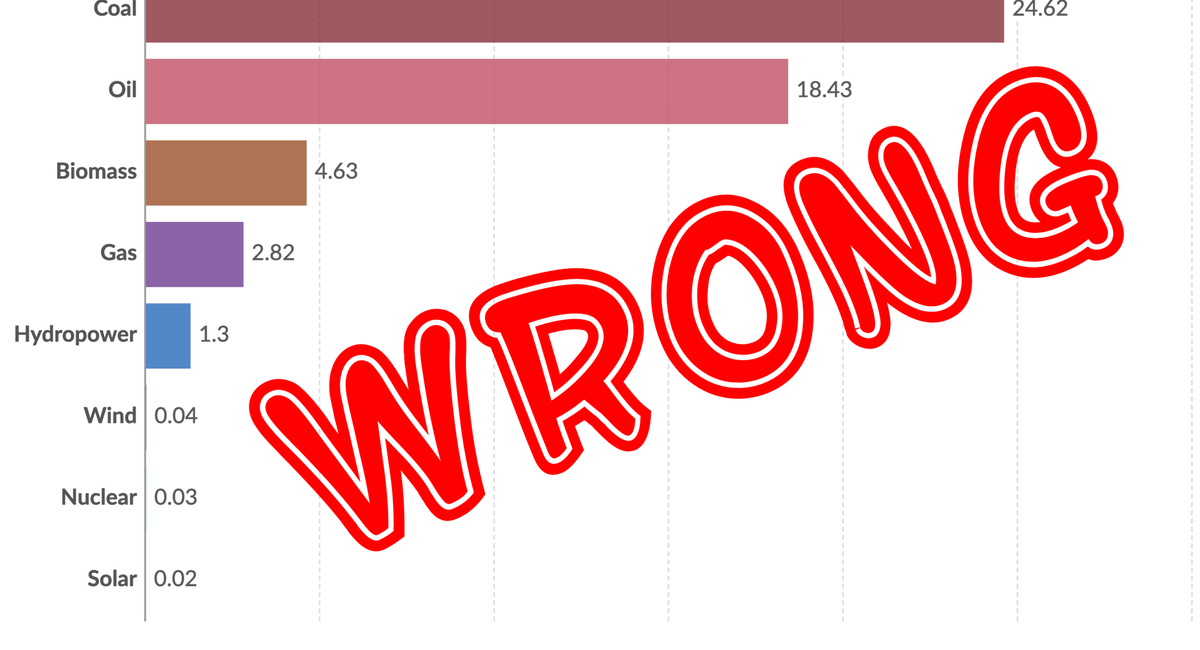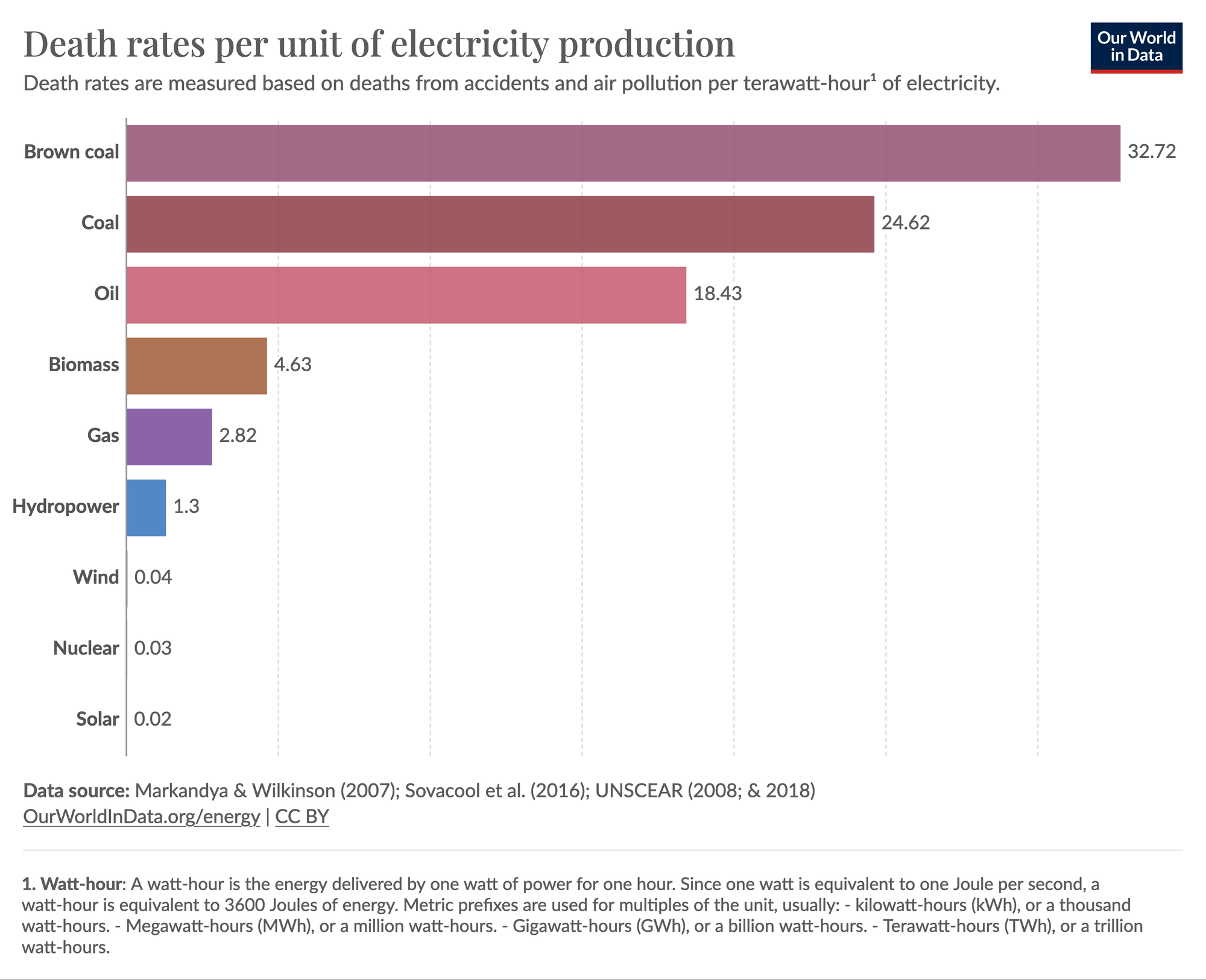Why Our World In Data is wrong on nuclear safety

Our World in Data (OWID) is a valuable resource on the big problems that face our world: poverty, disease, hunger, climate change, war, existential risks, and inequality. Their energy coverage overall is great, but they badly got something wrong and I need to talk about that.
I'm specifically referring to the article titled What are the safest and cleanest sources of energy? In it author Hannah Ritchie explains exactly what it says on the tin. Overall a great piece, which I've used many times to educate people thinking nuclear energy is hazardous and/or polluting.

But... And this feels nitpicky but I'm going for it: the number for nuclear is way too high. Yes, the 0.03 per TWh is incorrect.
To see where I'm coming from, I'll just quote Hannah's reasoning:
Our perceptions of the safety of nuclear energy are strongly influenced by two accidents: Chernobyl in Ukraine in 1986 and Fukushima in Japan in 2011. These were tragic events. However, compared to the millions that die from fossil fuels every year, the final death tolls were very low. To calculate the death rates used here, I assume a death toll of 433 from Chernobyl, and 2,314 from Fukushima. If you are interested, I look at how many died in each accident in detail in a related article.
(emphasis mine)
In the related article she further elaborates:
How many died from the nuclear accident in Fukushima?
In March 2011, there was an accident at the Fukushima Daiichi Nuclear Power Plant in Ōkuma, Fukushima, Japan. This accident was caused by the 2011 Tōhoku earthquake and tsunami – the most powerful earthquake recorded in Japan’s history.
Despite it being such a large event, so far, only one death has been attributed to the disaster. This includes both the direct impact of the accident itself and the radiation exposure that followed. However, it’s estimated that several thousand died indirectly from the stress and disruption of evacuation.
(emphasis mine)
So, instead of attributing 1 person to have died from the incident (in 2018, from lung cancer, which is atypical for these kinds of incidents as far as I'm aware), she attributes more than 2000 people to have died under the category 'nuclear', not because of the Daiichi reactor actually causing these people to die, but because of fear of radiation.
Evacuations can indeed have a huge impact on one's health. As this paper on the effects of the Fukushima flood and nuclear incident states:
Although holding such concerns can seem less relevant compared to diagnosed diseases, concerns can be a cause of physical and mental health problems. For example, some Japanese have evacuated their homes to be further away from the Fukushima NPP. Evacuation has been reported as a risk factor for mortality [12] or subjective health [1] perhaps via physical strain, economic strain, and disrupted social support.
But was the evacuation needed because radiation levels were too high? UNSCEAR did an extensive research to exactly this question and states in their report:
Since the UNSCEAR 2013 Report, no adverse health effects among Fukushima residents have been documented that could be directly attributed to radiation exposure from the accident.
Exposure to radiation could lead to an increased incidence of disease in the exposed population; however for example, with cancer, it is not generally possible to distinguish by observation or testing whether or not the disease of a specific patient has been caused by the radiation exposure. The Committee has therefore assessed the risks resulting from radiation exposure following the accident by estimating whether any increased incidence of a particular disease, calculated theoretically from the estimated doses, would be detectable compared to the normal statistical variability in the baseline incidence of the disease in that population. The Committee’s conclusion is that its revised estimates of dose are such that future radiation-associated health effects are unlikely to be detectable.
We need to be clear in our rejection that fear for nuclear energy, indeed costing many lives, are to be attributed to nuclear energy. After all, because of Fukushima Germany choose to phase out their nuclear reactors, which cost a lot of lives:
Put another way, the phase-out resulted in more than 1,100 additional deaths per year from increased concentrations of SO2, NOx, and PM. The increase in production from hard coal plants is again the key driver here, making up roughly 80% of the increase in mortality impacts.
Should these too then be attributed to nuclear? I'm asking this rhetorically to hopefully make obvious how absurd it is.
The number shouldn't therefore be 0.03 deaths per TWh, but 0.005 (rounded up).
 Do you value this free article? Please consider a onetime donation or subsribe to read all of my content. Thank you!
Do you value this free article? Please consider a onetime donation or subsribe to read all of my content. Thank you!